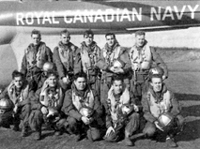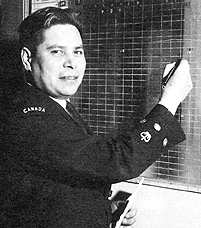A Career in the Navy

A specialist in anti-submarine techniques, Ted Jamieson instructed sailors aboard the Iroquois during the Korean War. He later joined a helicopter anti-submarine squadron. Jamieson is in the front row, centre, of the photos of the sonar aircrewmen of the 50th Squadron. (George C. Apps / Library and Archives Canada / PA-146296)
For George Edward (Ted) Jamieson, there truly was no life like the navy. The Toronto-born member of the Six Nations Upper Cayuga Band was a sea cadet in his early teens and, a few years later, a bugler in the Royal Canadian Naval Volunteer Reserve. At the outbreak of the Second World War, the 18-year-old was among the first group of reservists called up. He was still with the navy when the Korean War erupted.
During the Second World War, Jamieson, an able seaman90 in the gunnery branch, served on HMCS Stadacona, HMCS Drummondville and HMCS Cornwallis. On convoy duty in the Battle of the Atlantic, he helped escort Allied ships along Canada's coasts and across the ocean.
Jamieson was aboard the tribal class destroyer HMCS Iroquois when it was assigned its first tour of duty in Korean waters in 1952. The year before he had been awarded the Canadian Forces Decoration (CD) for 12 years of service, and had recently extended his term with the RCN for another five years. At this point a chief petty officer second class (CPO 2),91 he became one of Canada's 3,621 naval personnel in the Far East.
On board the Iroquois, Jamieson employed the specialized training he had received in anti-submarine warfare, serving as the Chief Torpedo Anti-submarine (TAS) Instructor. In Korea, however, naval duties were unusual. Because North Korea's small navy had been destroyed early in the war, RCN crews faced no threats from enemy destroyers. Submarines also posed no danger, although their presence was always considered possible.

After the war, Jamieson became senior instructor at the navy's torpedo anti-submarine school in Halifax. He was responsible for overseeing the instructors and preparing course material and exams. (Department of National Defense / Ruby Jamieson)
For the most part, the RCN ships in Korea blockaded the enemy coasts, attacked enemy coastal positions and protected neighbouring islands. In the absence of enemy warships, the greatest dangers to naval personnel were mines and enemy shore batteries.
The Iroquois became the RCN's only battle casualty when it was hit from shore October 2, 1952. Stationed on the East Sea (Sea of Japan) on the east coast, the destroyer was firing at a railway line when it came under attack. Three men died, two suffered serious wounds and eight sustained minor injuries. Jamieson was unharmed. The next day, the destroyer was back in action bombarding enemy targets on shore.
Jamieson remained on board the Iroquois until January 1953. While returning to Halifax, he assumed the duties of Chief Boatswain's Mate.92 The Veteran sailor was also a qualified anti-submarine specialist in the air. In the summer of 1953, he served as a sonar93 crewman in a U.S. anti-submarine helicopter squadron stationed in North Carolina. Afterward, Jamieson served as Senior Instructional CPO at the TAS School in Halifax, where he oversaw instructors and prepared course material and examinations. That year he was also selected by the RCN to receive the Queen's Coronation Medal. In 1955, he was promoted CPO First Class – the navy's most senior NCO rank.
CPO Jamieson retired from the navy in 1960, but maintained an association until 1965 by having his name added to the Reserve Emergency List. He began a new career in social services, working as a staff sergeant at a correctional institution for 15 years, and then as a counsellor at a Six Nations' drug and alcohol centre for 11 years. Jamieson died in Brantford in 1987 at the age of 65.
Today Jamieson's widow, Ruby, remembers her husband's accomplishments with pride:
He started from the very bottom, and retired as a 1st Class Chief Petty Officer—a young Native man from the Six Nations Reserve . . . . He thought it was an honour to serve his country.94
- Date modified: